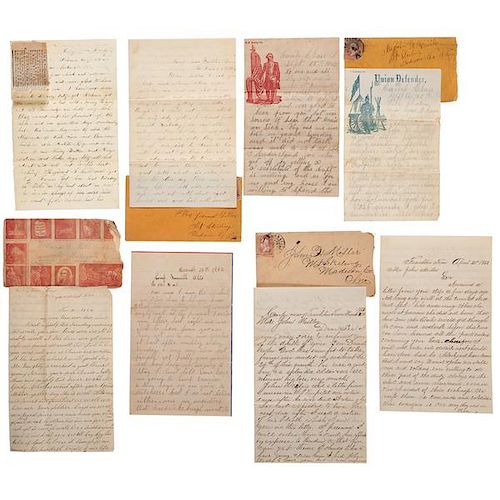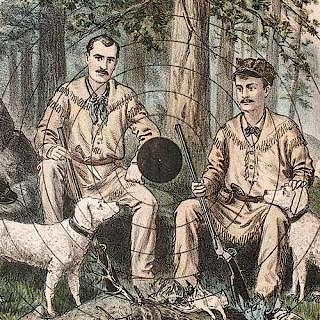Brothers Daniel & John Miller, Ohio 113th Infantry, Both DOD, Civil War Archive
About Seller
6270 Este Ave.
Cincinnati , OH 45232
United States
With offices in Cincinnati, Cleveland and Denver, Cowan’s holds over 40 auctions each year, with annual sales exceeding $16M. We reach buyers around the globe, and take pride in our reputation for integrity, customer service and great results. A full-service house, Cowan’s Auctions specializes in Am...Read more
Two ways to bid:
- Leave a max absentee bid and the platform will bid on your behalf up to your maximum bid during the live auction.
- Bid live during the auction and your bids will be submitted real-time to the auctioneer.
Bid Increments
| Price | Bid Increment |
|---|---|
| $0 | $25 |
| $500 | $50 |
| $1,000 | $100 |
| $2,000 | $250 |
| $5,000 | $500 |
| $10,000 | $1,000 |
| $20,000 | $2,500 |
| $50,000 | $5,000 |
| $100,000 | $10,000 |
About Auction
Nov 20, 2015 - Nov 21, 2015
Cowan's Auctions dawnie@cowans.com
- Lot Description
Brothers Daniel & John Miller, Ohio 113th Infantry, Both DOD, Civil War Archive
26 letters, including correspondence between members of the Miller family as well as letters from Daniel Miller’s commanding officer, with the majority written by Daniel Miller to his family back home, many accompanied by the original envelopes. September 1862-April 1863.
Brothers Daniel and John Miller were two of the five children of John Henry Miller (1814-73) and Jemima Davis Clark Miller (1808-76). They lived in Madison County, OH, where they worked on the family farm. Daniel D. Miller was born August 13, 1842 at Liberty, OH. He was working on the family farm when the Civil War broke out. Dan enlisted August 13, 1862 as a private and was mustered into Company G of the Ohio Volunteer Infantry (OVI) 113th Regiment on October 10, 1862. Before heading off to war, he married Anna Aliza McAlister in that same month. Unfortunately Miller’s service was rather short. He died at Nashville, TN, March 23, 1863 of disease (probably chronic diarrhea from contaminated water), and is buried at Pleasant Cemetery in Mount Sterling, OH.
John Wesley (Ky) Miller was born February 9, 1844 at Mt. Sterling, OH. He, too, was working on the family farm when the Civil War broke out and enlisted at the same time as his brother Daniel, serving in the same capacity in the same military unit. The family saw a double tragedy when John also succumbed to illness (exact cause of death is not listed) shortly after his brother on April 18, 1863 at Franklin, TN. He is buried at Pleasant Cemetery.
The Ohio 113th Regiment Infantry (OVI) was organized at Camps Chase, Zanesville, and Dennison as well as in Urbana and Columbus, OH, between August and December 1862 for a three year enlistment period. The unit was under the command of Colonels James A. Wilcox and John G. Mitchell. The unit started its service in the Western Theater but was part of Sherman’s Atlanta Campaign, March to the Sea and advance through North Carolina.
In December 1862, the regiment was hastily ordered to Louisville, to counter a feared attack from John Hunt Morgan. In late January 1863, it was ordered to Nashville and then on to Franklin, TN. At Franklin, the 113th participated in several engagements with Confederate forces and helped to fortify the city. In September 1863, it marched to Chickamauga, to play an important role in battle. It was a bloody fight for the 113th with a loss of 138 officers and men out of 382.
The unit fought in the Army of the Cumberland with Sherman to the Battle of Bentonville where General Joseph Johnston surrendered. They moved on to Washington in April and mustered out at Louisville, KY, July 6, 1865. In the War the Regiment saw 10 officers and 259 enlisted men killed or die of disease.
This archive provides interesting insight into the lives of a Midwestern farm family who were caught up in events of the Civil War. The archive contains numerous citations of relatives, friends and acquaintances trying to make their way through the war with many not succeeding. The letters tell stories of men freezing to death on picket duty, an unfortunate soldier who was run over and killed by railway cars and the enormous amount of illness in the camps.
They also tell the stories of young men seeing a much bigger world than what they have ever known in rural Ohio. Daniel relates several interesting accounts: of becoming familiarized with immigrant soldiers, Co I is all Dutch and Irish and they are the hardest meanest set of men I ever saw…they are worse than hogs; his encounter with …a slave [woman] here in camp …[who] told me they sold her husband after they had been married for three years & took him South & she had never heard from him since. I think soldiering is nothing; the effects of the Emancipation Proclamation, the soldiers does not like the taste of Lincoln’s Proclamation…there has been about half dozen officers resigned. John felt the pangs of homesickness when writing, I often dream of home and all of you and what nice things you have there, and…I wake up [and] it is all a dream.
Another theme throughout the archive is the strong religious conviction of the Great Awakening in the US at that time. Apparently the family members were Masons but were also connected to the temperance and abolitionist group, the International Order of Good Templars. Particularly interesting is an exchange between mother Jemima and her sons. She writes, your mother has [prayed] for you every day since you have had a being…[but] let me tell you that there is nothing worth living for but the religion of Jesus…I am not afraid of you doing anything to disgrace yourselves…if you put your trust in the Lord you will come off conquerors. Daniel replies in his next letter, You need not be uneasy about me doing anything to disgrace myself or you for I have resolved to suffer death first. I will remember the oath I took in the Masonic Hall and I have been trying to live up to it.The letters are in good to very good condition with some light fading. Many have original stamped or unstamped envelopes.Condition
- Shipping Info
-
SHIPPING. At the request of the buyer, Cowan's will authorize the shipment of purchased items. Shipments usually occur within two weeks after payment has been received. Shipment is generally made via UPS Ground service. Unless buyer gives special instructions, the shipping method shall be at the sole discretion of Cowan's Auctions, Inc.. Cowan's is in no way responsible for the acts or omissions of independent handlers, packers or shippers of purchased items or for any loss, damage or delay from the packing or shipping of any property.
-
- Buyer's Premium



 EUR
EUR CAD
CAD AUD
AUD GBP
GBP MXN
MXN HKD
HKD CNY
CNY MYR
MYR SEK
SEK SGD
SGD CHF
CHF THB
THB











